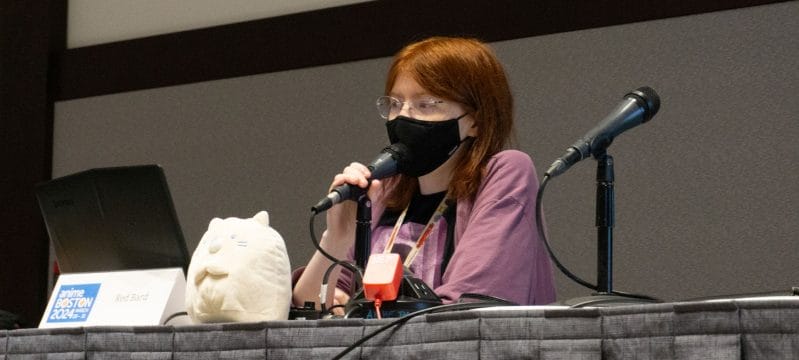[et_pb_section fb_built=”1″ _builder_version=”3.0.47″][et_pb_row _builder_version=”3.0.48″ background_size=”initial” background_position=”top_left” background_repeat=”repeat”][et_pb_column type=”4_4″ _builder_version=”3.0.47″][et_pb_text admin_label=”Introduction” _builder_version=”3.19.18″]
Content Warning: This article discusses topics related to transphobia, and includes at least one slur, used in an explanatory context.
Spoiler Warning: This article discusses, in-depth, events that occur in Double Decker! Doug & Kirill episodes six through eight.
Part One of Two in our “Fall 2018 Trans Anime” Article series.
On March 28, I came out to the world as transgender. It was a day I’ll always remember, as it was the first time that I actually embraced my true self, and took real steps toward becoming the person I really wanted to be.
With each day, I find my tastes shifting, as I cast aside the worries and the shame that came from nearly two decades of repression. I had begun to explore the anime world anew, just as I have my own life. I’ve wept to A Place Further Than The Universe, gave all my “awws” to Cells At Work!, and found myself absorbed in the world of Banana Fish. I laughed like a goon to Pop Team Epic, and tried to claw my own eyes out with Happy Sugar Life.
It’s been a brilliant swirl of chaos, the likes of which I haven’t experienced since the early ‘90s, when I’d sit in club meetings to watch Sailor Moon and Dirty Pair. And, frankly, it’s been, well, liberating to be able to watch anime without having to hold back. For the first time in what feels like forever, I haven’t had to hide behind that wall of false masculinity that I had propped up for far too many years.
[/et_pb_text][et_pb_text admin_label=”Double Decker Description 001″ _builder_version=”3.18.3″]
This season, I found myself drawn to Double Decker! Doug & Kirill: a charming buddy cop series set in the Tiger & Bunny universe. Despite being set in the same world, the two shows exist wholly on their own, meaning that viewers can easily enjoy Double Decker! without watching Tiger & Bunny, and vice versa.
The title revolves around an elite group of officers known as SEVEN-O, who are tasked with tracking down and suppressing the growing epidemic of a designer drug known as “Anthem.” It’s an an over-the-top, chaotic sugar rush that ricochets between action and exposition. And, well, it’s exactly what a viewer should expect from an anime series about a secret police division that uses bionic eyes and hyper-powered weapons to hunt down criminals using gene-altering drugs. (You read that right) The writing is sharp and witty, breathing life into the show’s quirky cast, who leap off the screen and into the viewer’s heart. At the same time, the scripts are gleefully self-aware, and know exactly when to call an asshole an asshole… even if it’s talking about its own lead characters.
[/et_pb_text][et_pb_image src=”https://cdn.animeherald.com/aniheraldcdn/2018/12/Double-Decker-Episode-4-001-20181206.jpg” url_new_window=”on” admin_label=”Image – Doug’s An Asshole” _builder_version=”3.18″][/et_pb_image][et_pb_text admin_label=”Double Decker Description Part 002″ _builder_version=”3.18.3″]
The visuals are slick and stylish, making wonderful use of color and shading to set the mood of a scene, or give that perfect “oomph” to a random cutaway gimmick.
[/et_pb_text][et_pb_image src=”https://cdn.animeherald.com/aniheraldcdn/2018/12/Double-Decker-Episode-2-001-20181206.jpg” url_new_window=”on” admin_label=”Image – Cutaway” _builder_version=”3.18″][/et_pb_image][et_pb_text admin_label=”Show Intro 003″ _builder_version=”3.18.3″]
Beneath the flashy veneer, it’s easy to see a sharp progressive streak within the narrative that’s generated a fair amount of buzz. The team at Sunrise uses Double Decker!’s quirky cast and beautifully choreographed gunfights as a vehicle for highlighting pressing social issues, such as workers’ rights, social justice, and gender equality.
Heck, four out the six active field members in SEVEN-O are women, though leader Travis Murphy is still a heterosexual male because ingrained power structures are a thing.
At the same time, the show is delightfully queer. Though never explicitly stated, several of the major characters are coded as gay or bisexual, with the most prominent pairing being that of Max and Yuri.
[/et_pb_text][et_pb_image src=”https://cdn.animeherald.com/aniheraldcdn/2018/12/Double-Decker-Intro-001-20181206.jpg” url_new_window=”on” admin_label=”Image – Max & Yuri” _builder_version=”3.18″][/et_pb_image][et_pb_text admin_label=”Trans Representation 001 – Milla/Valery Part I” _builder_version=”3.18″]
The title has made a couple of attempts at transgender representation in recent weeks.
The first of these enters the spotlight in the show’s sixth episode, “Up Close And Personal! 24 Hours with the Lisavalletta Police.” A chance appearance on popular cop show “Police 24” (think C.O.P.S.) sees Kirill’s long-lost sister Milla appearing on-camera for the briefest of moments.
Much of the search is performed by Dr. Apple, who tries to piece together her whereabouts using far too many cameras than I’m comfortable thinking about. Meanwhile, Doug and Kirill track down a wanted criminal who also appeared on the tape.
The episode’s events come to a head in the finale, as everyone gathers at Derick’s bar for a few rounds. Derick starts talking up his new hire, who finally makes herself known. As fate would have it, Kirill’s sister Milla is suddenly there, in the flesh, and the audience is suddenly experiencing a beautiful, long-awaited reunion.
[/et_pb_text][et_pb_image src=”https://cdn.animeherald.com/aniheraldcdn/2018/12/Double-Decker-Episode-6-001-20181206.jpg” url_new_window=”on” admin_label=”Image – Milla Intro” _builder_version=”3.18″][/et_pb_image][et_pb_text admin_label=”Trans Representation 001 – Milla/Valery Part II” _builder_version=”3.18″]
The warm fuzzies don’t last very long.
In a post-credits scene, Kirill wanders sleepily into the men’s room to relieve himself after a long night of drinking with the gang. Suddenly, Dr. Apple bursts in, claiming that he “found out something very bad.”
The camera cuts to Kirill, who’s standing at the urinal. He cranes his neck to the left, to sees his sister standing at the next toilet over, prompting a look of shock and horror. The camera cuts back to the gang outside, who gleefully explain that Milla is a man, and that she disappeared in the manhunt because she went into the men’s room, rather than the women’s room!
[/et_pb_text][et_pb_image src=”https://cdn.animeherald.com/aniheraldcdn/2018/12/Double-Decker-Episode-6-002-20181206.jpg.jpg” url_new_window=”on” admin_label=”Image – %22Something Bad!%22″ _builder_version=”3.18″][/et_pb_image][et_pb_text admin_label=”Trans Representation 001 – Milla/Valery Part III” _builder_version=”3.18″]
Apparently, you’re supposed to laugh, here.
The camera cuts back to Kirill and Milla in the men’s room, where Milla is explaining that she’s not Kirill’s dear sister, but is in fact his big brother named Valery.
The show’s seventh episode, Revenge Is Mine!, picks up right where the previous left off, with the members of SEVEN-O discussing the previous night’s events. Kirill, to his credit, is pretty happy about to find his sibling, regardless of how they present themself.
[/et_pb_text][et_pb_image src=”https://cdn.animeherald.com/aniheraldcdn/2018/12/Double-Decker-Episode-6-004-20181206.jpg” url_new_window=”on” admin_label=”Image – Milla/Valery in Bathroom” _builder_version=”3.18″][/et_pb_image][et_pb_text admin_label=”Trans Representation 001 – Milla/Valery Part IV” _builder_version=”3.18″]
The rest of the team, though, plays it up as a big joke. Despite Valery stating that it’s no huge deal, Deana swears the team to secrecy on the matter. She plays up more than a few stereotypes, including overtly stating “how awful it would be that Derick learns that his new waitress is a man” at one point.
Deana’s logic for her actions are simple: It’s more fun this way.
[/et_pb_text][et_pb_image src=”https://cdn.animeherald.com/aniheraldcdn/2018/12/Double-Decker-Episode-7-001-20181206.jpg.jpg” url_new_window=”on” admin_label=”Image – Deana – %22It’s More Fun%22″ _builder_version=”3.18″][/et_pb_image][et_pb_text admin_label=”Trans Representation 001 – Max Part I” _builder_version=”3.18″]
The next episode, Dancing! Academy Investigation, makes an attempt to introduce an overtly transgender character into the show’s canon. In the installment’s final minutes, a series of flashbacks show Max in her high school days, narrated by Yuri. Max was friends with a closeted trans girl, whom she had hoped to go to prom with. Before prom, Conor came out to her, leading Max to shave her head and adopt her gothy styles in solidarity. The two attended prom together, Max in a tux and the girl in a lovely dress.
People, being people, rejected the couple, barring them from entering the building. The incident caused the girl to become a drug addict and leave town, disappearing forever. Through the story, Yuri and Max deadname and misgender the girl repeatedly, never once referring to her by her preferred name.
[/et_pb_text][et_pb_image src=”https://cdn.animeherald.com/aniheraldcdn/2018/12/Double-Decker-Episode-8-001-20181206.jpg” url_new_window=”on” admin_label=”Image – Max with Friend” _builder_version=”3.18″][/et_pb_image][et_pb_text admin_label=”Text – Opinion Part I” _builder_version=”3.18″]
There is a lot going on across both of these situations, with very little of it being good.
Looking at the case of Valery, we see the revival of a tired, and incredibly harmful “trap” meme. For the uninitiated, the word “trap” is slang for a male character who dresses like (and passes as) a woman as a means of “trapping” an unsuspecting person. It’s a common part of the web vernacular in certain corners of the web, and it’s often used as a means of diminishing and delegitimizing trans individuals in public forums.
Moreover, this is an incredibly dangerous trope to play into nowadays, as one of the most harmful, yet prevalent arguments for violence against transgender individuals is that they are not legitimate women or men; that they are deceiving people by presenting as a gender that wasn’t assigned to them at birth, and are therefore a threat.
This ideation plays heavily into “trans panic” defenses in cases of actual violence against trans individuals. The “trans panic” defense, which have been successfully used in an American court of law as recently as 2015, states that a defendant was justified in committing violence against a transgender individual, as it was the victim’s fault for presenting as their chosen gender.
Whether it’s by “diminished capacity” (temporary insanity), “provocation” (the tran’s person caused this!), or self-defense (us scary “trans peoples” are such a threat), the end argument is that it is the trans individual’s fault for existing, and that violence against them is justified.
The fact that Double Decker! not only falls back on this, but leans into this by opening the second episode with “it’ll be funny” to not tell Derick paints Valery as little more than a running joke at that point.
I should note that Valery had no problems telling Derick, himself, at this point. Deana shuts him and everybody else up, though, because it would be funny to keep this toxic joke running.
[/et_pb_text][et_pb_image src=”https://cdn.animeherald.com/aniheraldcdn/2018/12/Double-Decker-Episode-7-002-20181206.jpg.jpg” admin_label=”Image – Don’t Tell Derik” _builder_version=”3.18″][/et_pb_image][et_pb_text admin_label=”Text – Don’t Tell Derick Caption” _builder_version=”3.18″]
Fuck you, Deana.
[/et_pb_text][et_pb_text admin_label=”Text – Opinion Part II” _builder_version=”3.18″]
Nevermind the fact that, again, this plays heavily into the harmful “trap” gags that have helped to further harmful stereotypes about trans people, removing Valery’s agency and turning him into a punchline.
The case of Max’s friend, in comparison, was a well-meaning, albeit ham-fisted approach to transgender representation. In this case, it was clear that the team tried; they really really tried to give nuance to a life-changing situation. Coming out to a friend, your best friend, is one of the scariest things a trans individual can do, right up there with coming out to family members and employers, and actually gathering the courage to go out in public.
And, for the most part, Max was shown to be an amazing ally, not only supporting her friend, but going as far as to change her entire style and escort her to the prom was brilliant. Where the story faltered was in the finer details. Through the entire narrative, the girl, whose name assigned at birth was Conor, is misgendered and deadnamed in every reference.
And, well… how do I explain this properly?
[/et_pb_text][et_pb_image src=”https://cdn.animeherald.com/aniheraldcdn/2018/12/Double-Decker-Episode-8-002-20181206.jpg.jpg” url_new_window=”on” admin_label=”Image – Deadname” _builder_version=”3.18″][/et_pb_image][et_pb_text admin_label=”Deadname – Caption” _builder_version=”3.18″]
Through the climactic segment of Episode 8, Max and Yuri repeatedly deadname the now-departed girl.
[/et_pb_text][et_pb_text admin_label=”Text – Opinion Part III” _builder_version=”3.18″]
“Deadnaming” is the practice of referring to a transgender individual as their name chosen at birth, rather than by the name they prefer to use. This is an invalidating practice, which is often used to undermine a transgender individual’s credibility and raise the specter that they’re hiding something, that they’re being deceptive in presenting as their preferred gender.
Moreover, deadnaming carries the risk of outing a transgender individual to people who may not be aware. This creates new risks, and new stresses that can lead to both physical and mental abuse. In 2015, the National Center for Transgender Equality’s 2015 U.S. Trans Survey found that more than 46 percent of all transgender individuals have been verbally harassed simply for existing. In that same survey, nine percent of transgender respondents stated that they were physically assaulted.
“Misgendering”, meanwhile, is the deliberate labeling of an individual with a gender that mismatches the gender they identify as. In plain, English, this would be like calling a woman “sir” or a man “ma’am.” It’s invalidating, and often used to undermine a transgender individual’s credibility while offering vectors for discrimination and assault from other areas.
For many transgender individuals, though, it’s also a sad fact of life that many trans individuals encounter. Transmen and transwomen are commonly misgendered in the media, by the police, even by their coworkers and family members. At all points in transition, from the very beginning to many years after we’ve been out and in public, there always seems to be a person who’s willing to remind the world that a trans individual presented differently at some point in their life.
[/et_pb_text][et_pb_image src=”https://cdn.animeherald.com/aniheraldcdn/2018/12/Double-Decker-Intro-002-20181206.jpg” url_new_window=”on” _builder_version=”3.18″][/et_pb_image][et_pb_text admin_label=”Text – Opinion Part IV” _builder_version=”3.18″]
The episode’s climax, which explains that the girl had left town after falling into drugs, does little to really solidify the character in any regard. She’s dropped unceremoniously at that point, and made into little more than a a prop for a sappy and convenient tragedy. She received a disappointing ending, which fits perfectly into the way Double Decker! treats more loaded social issues. The series is afraid to commit to firm stances on matters of this nature, instead opting to play with viewers through queerbaiting and half-measures.
Max and Yuri live together, they’re partners, and they’re basically the definition of “coded gay”, but the series won’t take that extra step to establish the fact. The factory workers in Episode 2 are oppressed, they’re on strike and fighting the cruel owners, but it’s okay, because the head of the union is also crooked!
And so on. It’s frustrating, and it’s borderline infuriating at times. Rather than take the time to build nuance, to craft characters and situations that are memorable and interesting, while remaining true to the messages they espouse, the writers instead choose to take the easy route by dropping a bomb, then running away. Max’s friend is no different. By the time the credits roll, she’s nothing more than a spectre; a ghost who’s been swept under the rug only to be forgotten, while the underlying message falls on deaf ears. We don’t know her preferred name, we don’t have a reason to even want to know. The audience will only know her as “Max’s trans friend”, or by her deadname.
That said, I do have to wonder if the eighth episode would have been more impactful had it arrived earlier in the series. Or, well, any time that wasn’t immediately after the transphobic joke character was introduced.
Despite its flaws, the team clearly made attempts to bring in a message that transgender individuals are people, who fall often do prey to social pressures that the typical cisgender individual will never see. It was a small, important step toward true transgender representation that was unsure and clumsy, but it was a real attempt at representation that is rarely seen in major anime titles. It’s a shame that it came across as an angry fart noise.
Given how strongly Double Decker! resonates within the queer community, it’s hard to see the show’s treatment of transgender characters as anything other than a missed opportunity. In both of its attempts to introduce transgender-coded characters into the series, Double Decker! has fallen short. The series tiptoes just close enough to the line to offer some form of hope, before retreating hastily toward the most familiar tropes and gimmicks. When one stops to consider the transphobic crossdressing gags with Valery, the unrelenting misgendering and deadnaming of Max’s friend, it all feels like the staff interpreted “inclusion” as “LGBQ and sometimes T.”
[/et_pb_text][et_pb_cta title=”Support Anime Herald on Patreon” button_url=”https://www.patreon.com/bePatron?u=8646351″ url_new_window=”on” button_text=”Become a Patron” _builder_version=”3.16″ background_color=”#222c35″ saved_tabs=”all” button_text_size__hover_enabled=”off” button_text_size__hover=”null” button_one_text_size__hover_enabled=”off” button_one_text_size__hover=”null” button_two_text_size__hover_enabled=”off” button_two_text_size__hover=”null” button_text_color__hover_enabled=”off” button_text_color__hover=”null” button_one_text_color__hover_enabled=”off” button_one_text_color__hover=”null” button_two_text_color__hover_enabled=”off” button_two_text_color__hover=”null” button_border_width__hover_enabled=”off” button_border_width__hover=”null” button_one_border_width__hover_enabled=”off” button_one_border_width__hover=”null” button_two_border_width__hover_enabled=”off” button_two_border_width__hover=”null” button_border_color__hover_enabled=”off” button_border_color__hover=”null” button_one_border_color__hover_enabled=”off” button_one_border_color__hover=”null” button_two_border_color__hover_enabled=”off” button_two_border_color__hover=”null” button_border_radius__hover_enabled=”off” button_border_radius__hover=”null” button_one_border_radius__hover_enabled=”off” button_one_border_radius__hover=”null” button_two_border_radius__hover_enabled=”off” button_two_border_radius__hover=”null” button_letter_spacing__hover_enabled=”off” button_letter_spacing__hover=”null” button_one_letter_spacing__hover_enabled=”off” button_one_letter_spacing__hover=”null” button_two_letter_spacing__hover_enabled=”off” button_two_letter_spacing__hover=”null” button_bg_color__hover_enabled=”off” button_bg_color__hover=”null” button_one_bg_color__hover_enabled=”off” button_one_bg_color__hover=”null” button_two_bg_color__hover_enabled=”off” button_two_bg_color__hover=”null”]
If you enjoyed this article, why not consider backing us on Patreon? For just $1 a month, you can help support more articles like this, and gain access to goodies like exclusive behind-the-scenes articles and Director’s Cut versions of classic content.
[/et_pb_cta][/et_pb_column][/et_pb_row][/et_pb_section]












